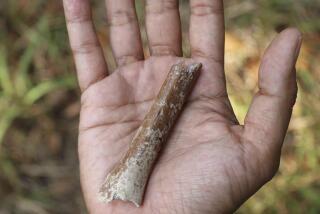Fossils Give New Date for Habitation of China
- Share via
A fragment of a jaw and three teeth found in a cave in southwest China suggest that early humans arrived in mainland Asia more than half a million years earlier than thought, scientists reported.
In the current issue of the journal Nature, the team of international researchers said three dating techniques put the age of the fossils at 1.8 million to 2 million years old. The findings reinforce a recent idea that the group of species called Homo-- which includes humans--spread out of Africa soon after it evolved from an earlier ancestor, the researchers said.
A separate article in this week’s Nature reports that this earlier ancestor, Australopithecus, was also more widely traveled than previously thought. Fossils of this species had been confined to South Africa and Rift Valley in the eastern part of the continent, but now scientists from France and Harvard University have found part of a 3-million-year-old jaw in Chad, about 1,500 miles west of the Rift Valley.
At one time, scientists believed that Asia was peopled only relatively recently, within the past several hundred thousand years. More recent fossil findings had pushed that date back to about 1 million years.
The new Chinese site “shoves this back half a million years or more,” said F. Clark Howell, professor of anthropology at UC Berkeley. “It’s kind of a link between Africa and Asia.”
Scientists working at the site in eastern Sichuan province also found rudimentary stone tools. One was a round, river-worn stone, slightly smaller than a tennis ball, said University of Massachusetts anthropologist Roy Larick, one of the article’s authors.
Three rough, pitted areas indicated that the stone had been used for crushing food. “These early tools were simple extensions of the hand,” Larick said.
Coupled with the discovery last year of hominid fossils and stone tools in the former Soviet republic of Georgia dating back at least 1.5 million years, the China finding suggests that this primitive technology was integral to early humans’ move out of Africa.
“It gave early humans a different quality of life,” Larick said.






